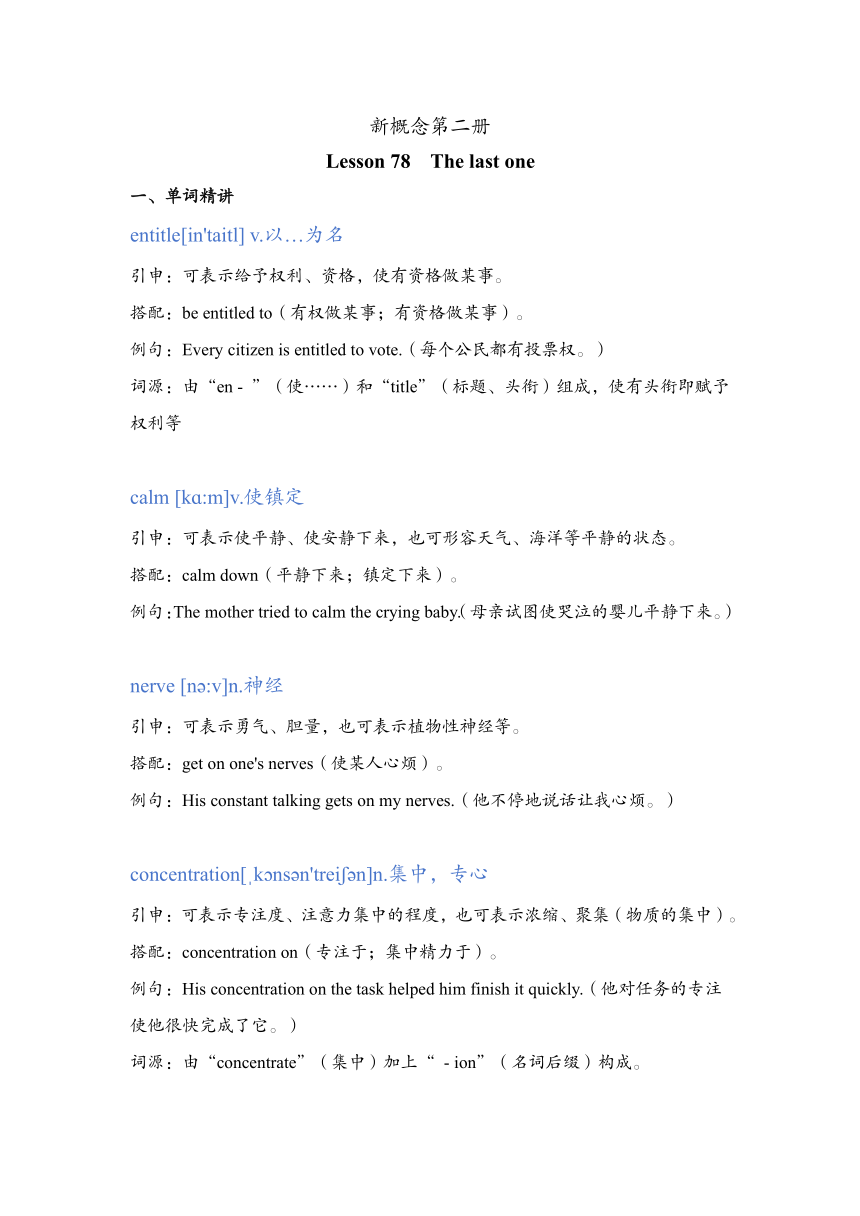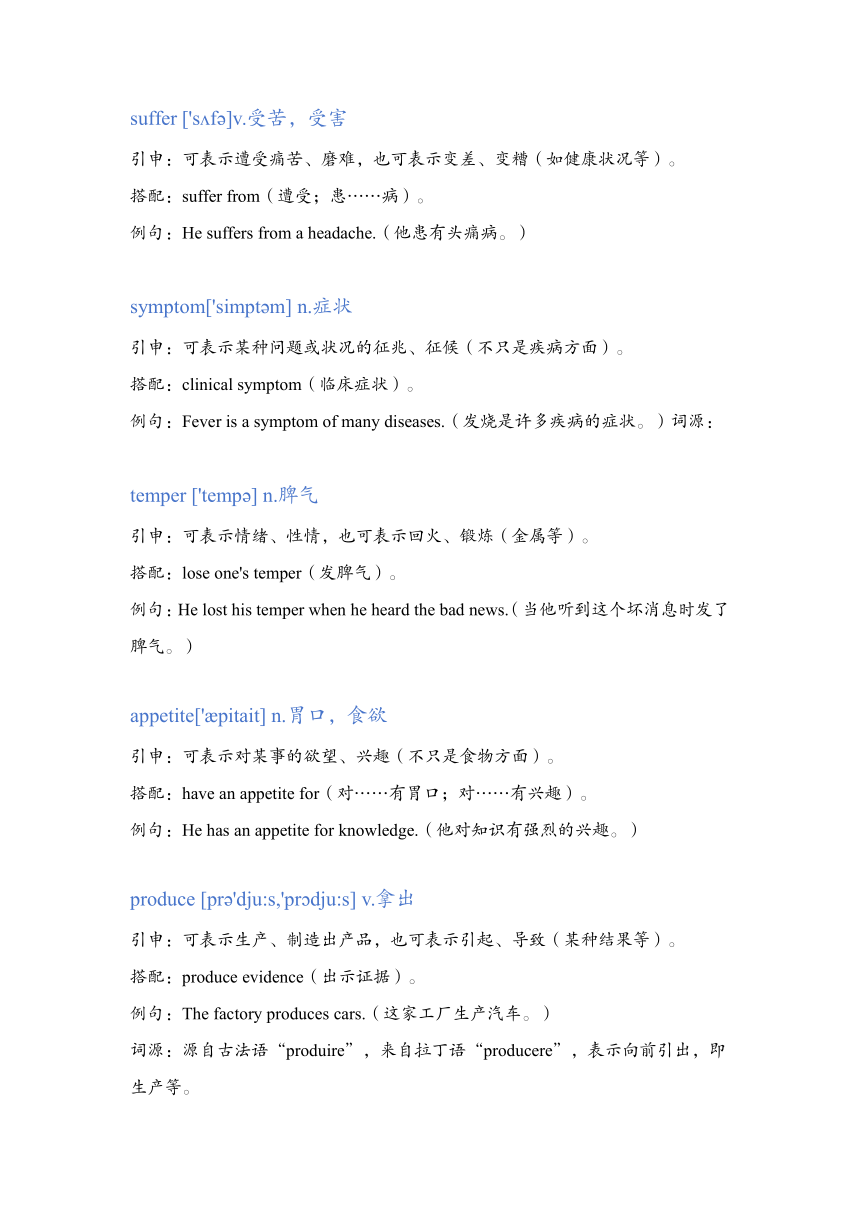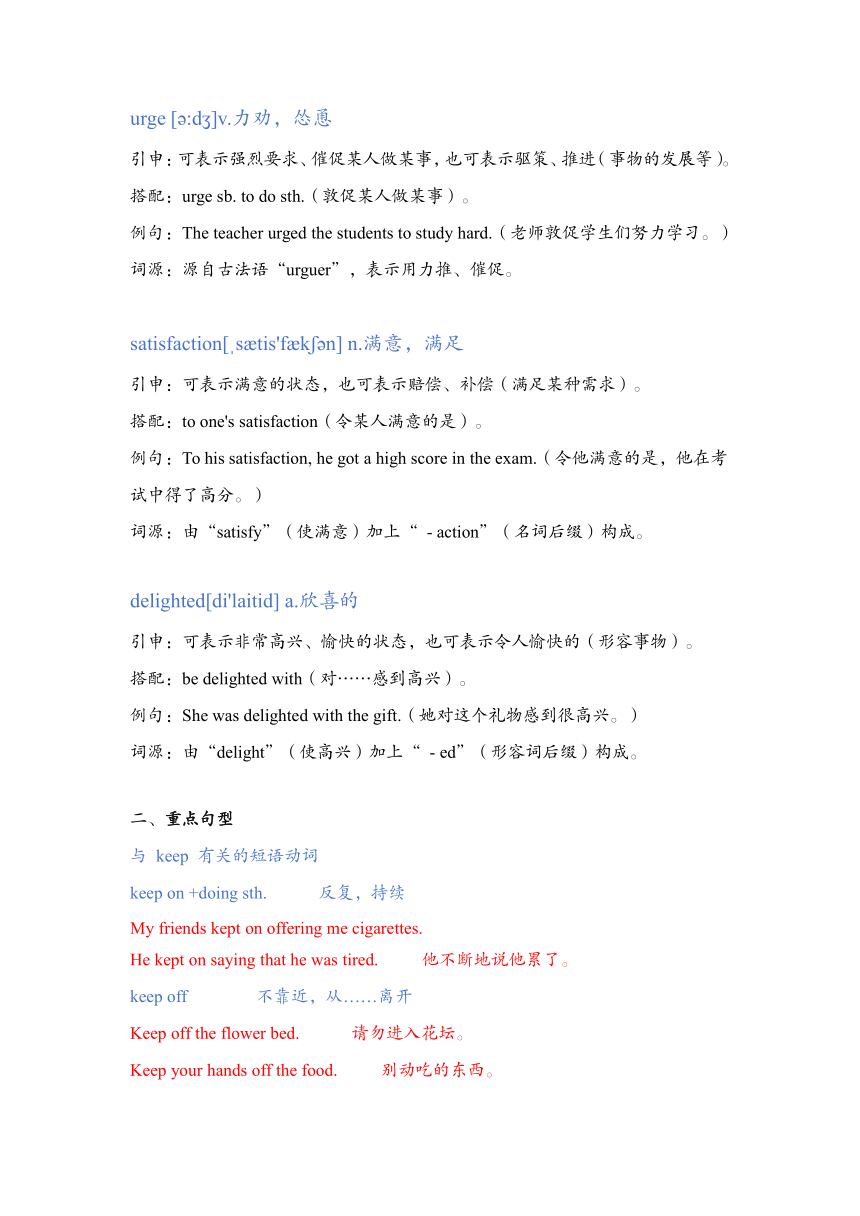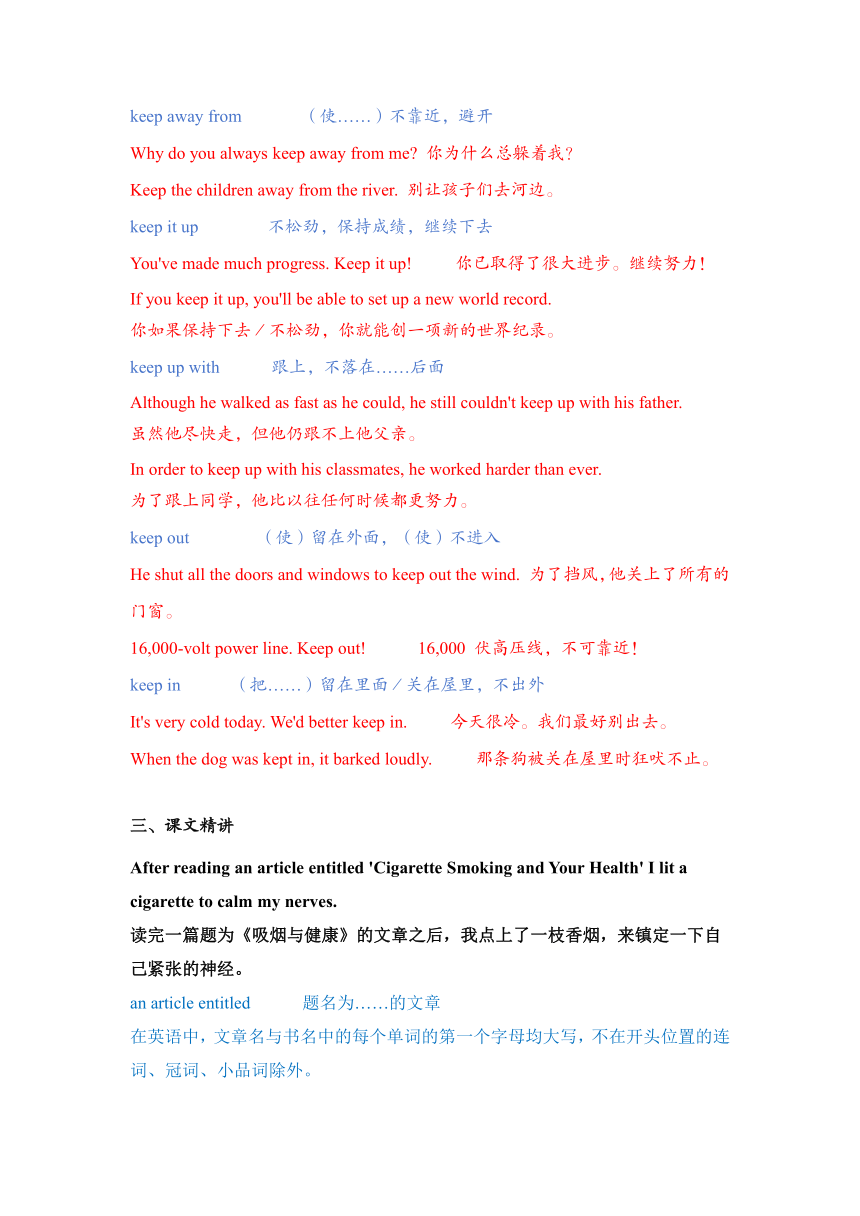新概念第二册Lesson 78 The last one讲义
文档属性
| 名称 | 新概念第二册Lesson 78 The last one讲义 |  | |
| 格式 | docx | ||
| 文件大小 | 131.0KB | ||
| 资源类型 | 教案 | ||
| 版本资源 | 新概念英语 | ||
| 科目 | 英语 | ||
| 更新时间 | 2024-11-24 21:52:10 | ||
图片预览




文档简介
新概念第二册
Lesson 78 The last one
单词精讲
entitle[in'taitl] v.以…为名
引申:可表示给予权利、资格,使有资格做某事。
搭配:be entitled to(有权做某事;有资格做某事)。
例句:Every citizen is entitled to vote.(每个公民都有投票权。)
词源:由“en - ”(使……)和“title”(标题、头衔)组成,使有头衔即赋予权利等
calm [kɑ:m]v.使镇定
引申:可表示使平静、使安静下来,也可形容天气、海洋等平静的状态。
搭配:calm down(平静下来;镇定下来)。
例句:The mother tried to calm the crying baby.(母亲试图使哭泣的婴儿平静下来。)
nerve [n :v]n.神经
引申:可表示勇气、胆量,也可表示植物性神经等。
搭配:get on one's nerves(使某人心烦)。
例句:His constant talking gets on my nerves.(他不停地说话让我心烦。)
concentration[ k ns n'trei n]n.集中,专心
引申:可表示专注度、注意力集中的程度,也可表示浓缩、聚集(物质的集中)。
搭配:concentration on(专注于;集中精力于)。
例句:His concentration on the task helped him finish it quickly.(他对任务的专注使他很快完成了它。)
词源:由“concentrate”(集中)加上“ - ion”(名词后缀)构成。
suffer ['s f ]v.受苦,受害
引申:可表示遭受痛苦、磨难,也可表示变差、变糟(如健康状况等)。
搭配:suffer from(遭受;患……病)。
例句:He suffers from a headache.(他患有头痛病。)
symptom['simpt m] n.症状
引申:可表示某种问题或状况的征兆、征候(不只是疾病方面)。
搭配:clinical symptom(临床症状)。
例句:Fever is a symptom of many diseases.(发烧是许多疾病的症状。)词源:
temper ['temp ] n.脾气
引申:可表示情绪、性情,也可表示回火、锻炼(金属等)。
搭配:lose one's temper(发脾气)。
例句:He lost his temper when he heard the bad news.(当他听到这个坏消息时发了脾气。)
appetite[' pitait] n.胃口,食欲
引申:可表示对某事的欲望、兴趣(不只是食物方面)。
搭配:have an appetite for(对……有胃口;对……有兴趣)。
例句:He has an appetite for knowledge.(他对知识有强烈的兴趣。)
produce [pr 'dju:s,'pr dju:s] v.拿出
引申:可表示生产、制造出产品,也可表示引起、导致(某种结果等)。
搭配:produce evidence(出示证据)。
例句:The factory produces cars.(这家工厂生产汽车。)
词源:源自古法语“produire”,来自拉丁语“producere”,表示向前引出,即生产等。
urge [ :d ]v.力劝,怂恿
引申:可表示强烈要求、催促某人做某事,也可表示驱策、推进(事物的发展等)。
搭配:urge sb. to do sth.(敦促某人做某事)。
例句:The teacher urged the students to study hard.(老师敦促学生们努力学习。)
词源:源自古法语“urguer”,表示用力推、催促。
satisfaction[ s tis'f k n] n.满意,满足
引申:可表示满意的状态,也可表示赔偿、补偿(满足某种需求)。
搭配:to one's satisfaction(令某人满意的是)。
例句:To his satisfaction, he got a high score in the exam.(令他满意的是,他在考试中得了高分。)
词源:由“satisfy”(使满意)加上“ - action”(名词后缀)构成。
delighted[di'laitid] a.欣喜的
引申:可表示非常高兴、愉快的状态,也可表示令人愉快的(形容事物)。
搭配:be delighted with(对……感到高兴)。
例句:She was delighted with the gift.(她对这个礼物感到很高兴。)
词源:由“delight”(使高兴)加上“ - ed”(形容词后缀)构成。
重点句型
与 keep 有关的短语动词
keep on +doing sth. 反复,持续
My friends kept on offering me cigarettes.
He kept on saying that he was tired. 他不断地说他累了。
keep off 不靠近,从……离开
Keep off the flower bed. 请勿进入花坛。
Keep your hands off the food. 别动吃的东西。
keep away from (使……)不靠近,避开
Why do you always keep away from me 你为什么总躲着我?
Keep the children away from the river. 别让孩子们去河边。
keep it up 不松劲,保持成绩,继续下去
You've made much progress. Keep it up! 你已取得了很大进步。继续努力!
If you keep it up, you'll be able to set up a new world record.
你如果保持下去/不松劲,你就能创一项新的世界纪录。
keep up with 跟上,不落在……后面
Although he walked as fast as he could, he still couldn't keep up with his father.
虽然他尽快走,但他仍跟不上他父亲。
In order to keep up with his classmates, he worked harder than ever.
为了跟上同学,他比以往任何时候都更努力。
keep out (使)留在外面,(使)不进入
He shut all the doors and windows to keep out the wind. 为了挡风,他关上了所有的门窗。
16,000-volt power line. Keep out! 16,000 伏高压线,不可靠近!
keep in (把……)留在里面/关在屋里,不出外
It's very cold today. We'd better keep in. 今天很冷。我们最好别出去。
When the dog was kept in, it barked loudly. 那条狗被关在屋里时狂吠不止。
课文精讲
After reading an article entitled 'Cigarette Smoking and Your Health' I lit a cigarette to calm my nerves.
读完一篇题为《吸烟与健康》的文章之后,我点上了一枝香烟,来镇定一下自己紧张的神经。
an article entitled 题名为……的文章
在英语中,文章名与书名中的每个单词的第一个字母均大写,不在开头位置的连词、冠词、小品词除外。
lit (light,light) v. 点燃
I lit a cigarette.
lighted adj. 被点燃的
This is a lighted cigarette.
My friends kept on offering cigarettes and cigars.
keep on doing sth. = continue doing sth. 持续不断的做
The child was crying loudly, but he kept on watching TV.
cigar n. 雪茄
offer sb. sth. 给某人某物
I smoked with concentration and pleasure as I was sure that this would be my last cigarette.
我聚精会神而又愉快地吸着这枝烟。因为我确信这是我最后一枝烟了。
句子结构:这是一个主从复合句。主句是“I smoked with concentration and pleasure”,其中“I”是主语,“smoked”是谓语,“with concentration and pleasure”是伴随状语,表示抽烟时的状态。
“as I was sure that this would be my last cigarette”是原因状语从句,其中“as”引导原因状语从句,“I”是从句主语,“was sure”是谓语,“that this would be my last cigarette”是宾语从句,表示确信的内容。
词汇精讲:“concentration”在这里表示专注,“with concentration”表示专注地。
For a whole week I did not smoke at all and during this time, my wife suffered terribly.整整一个星期我根本没有吸烟。在此期间,我妻子吃尽了苦头。
句子结构:这是一个并列句。第一个分句“For a whole week I did not smoke at all”中,“For a whole week”是时间状语,“I”是主语,“did not smoke”是谓语,表示不抽烟的状态;第二个分句“during this time, my wife suffered terribly”中,“during this time”是时间状语,“my wife”是主语,“suffered”是谓语,“terribly”是副词,修饰“suffered”,表示受苦的程度。
词汇精讲:“suffer”表示受苦、遭受痛苦,“suffer terribly”表示遭受极大的痛苦。
I had all the usual symptoms of someone giving up smoking: a bad temper and an enormous appetite.
我具备了戒烟者通常表现出来的所有症状:脾气暴躁和食欲旺盛。
句子结构:这是一个简单句。主语是“I”,“had”是谓语,表示拥有,“all the usual symptoms of someone giving up smoking”是宾语,其中“of someone giving up smoking”是后置定语,修饰“symptoms”,表示戒烟者的症状;“a bad temper and an enormous appetite”是对“symptoms”的具体说明。
词汇精讲:“symptom”表示症状,“usual symptoms”表示常见的症状。
“temper”表示脾气,“a bad temper”表示坏脾气。
“appetite”表示胃口、食欲,“an enormous appetite”表示极大的食欲。
My friends kept on offering me cigarettes and cigars.
我的朋友们不断地向我递香烟和雪茄。
句子结构:这是一个简单句。主语是“My friends”,“kept on offering”是谓语,表示持续做某事(这里是持续提供),“me”是间接宾语,“cigarettes and cigars”是直接宾语。
词汇精讲:“keep on doing sth.”是固定短语,表示继续做某事、不断做某事。
They made no effort to hide their amusement whenever I produced a packet of sweets from my pocket.
每当我从口袋里掏出一包糖果时,他们都毫不掩饰地表现出他们对此感到非常好笑。
make every effort 尽全力,尽一切努力
He made every effort to get/at getting the job.
make no effort 根本不作努力,毫不费力
make no effort to persuade him
She wrote the letter with/without effort. 她费力/毫不费力地写了那封信。
make effort + to do sth. 努力做……
no matter when = whenever 无论何时
no matter who = whoever 无论是谁
no matter where = wherever 无论在哪里
no matter how 无论怎样
When my old friend Brian urged me to accept a cigarette, it was more than I could bear.
was more than I could bear = I couldn't bear
more than后面跟一个从句或一个形容词时可以表示“超出”(多用于口语):
He was more than pleased with his new room.
This was more than I had expectd.
After seven days of this I went to a party.这样过了7天以后,我去参加一次聚会。
句子结构:这是一个简单句。“After seven days of this”是时间状语,表示经过七天这样的情况之后,“I”是主语,“went”是谓语,“to a party”是地点状语,表示去的地方是一个聚会。
Everybody around me was smoking and I felt extremely uncomfortable.
我周围的每个人都在吸烟,我感到非常不自在。
句子结构:这是一个并列句。第一个分句“Everybody around me was smoking”中,“Everybody around me”是主语,表示我周围的每个人,“was smoking”是谓语,表示正在抽烟的状态;第二个分句“I felt extremely uncomfortable”中,“I”是主语,“felt”是谓语,“extremely uncomfortable”是表语,表示感到非常不舒服。
When my old friend Brian urged me to accept a cigarette, it was more than I could bear.
当我的老朋友布赖恩极力劝我接受一枝香烟时,我再也忍不住了。
句子结构:这是一个主从复合句。“When my old friend Brian urged me to accept a cigarette”是时间状语从句,其中“When”引导时间状语从句,“my old friend Brian”是从句主语,“urged”是谓语,“me”是间接宾语,“to accept a cigarette”是直接宾语;主句是“it was more than I could bear”,其中“it”是形式主语,真正的主语是“to accept a cigarette”(在这种语境下可理解为接受一支烟这件事),“was more than I could bear”表示超出我所能忍受的范围。
词汇精讲:“urge”表示力劝、怂恿,“urge sb. to do sth.”表示敦促某人做某事。
I took one guiltily, lit it and smoked with satisfaction.
我内疚地接过一枝点上,心满意足地抽起来。
句子结构:这是一个简单句,有三个并列的谓语动作。主语是“I”,“took one guiltily”中“took”(take的过去式)是第一个谓语,表示拿(烟),“guiltily”是副词,修饰“took”,表示内疚地;“lit it”中“lit”(light的过去式)是第二个谓语,表示点燃;“smoked with satisfaction”中“smoked”是第三个谓语,表示抽烟,“with satisfaction”是伴随状语,表示满意地抽烟。
My wife was delighted that things had returned to normal once more.
一切又都恢复了正常,为此我妻子十分高兴。
句子结构:这是一个主从复合句。主句是“My wife was delighted”,其中“My wife”是主语,“was delighted”是谓语,表示高兴的状态;“that things had returned to normal once more”是宾语从句,表示高兴的原因,即事情又恢复正常了。
词汇精讲:“delighted”是形容词,表示高兴的、欣喜的。
Anyway, as Brian pointed out, it is the easiest thing in the world to give up smoking.
不管怎么说,正如布赖恩指出的那样,戒烟是世界上最容易的事情,他自己就已戒了很多次了!
anyway 不管如何
Anyway I love him.
Thank you anyway.
point out = explain 指出,指明
Why didn’t you point out his mistake to him at that time
He pointed out that we still had to get a few other things.
Lesson 78 The last one
单词精讲
entitle[in'taitl] v.以…为名
引申:可表示给予权利、资格,使有资格做某事。
搭配:be entitled to(有权做某事;有资格做某事)。
例句:Every citizen is entitled to vote.(每个公民都有投票权。)
词源:由“en - ”(使……)和“title”(标题、头衔)组成,使有头衔即赋予权利等
calm [kɑ:m]v.使镇定
引申:可表示使平静、使安静下来,也可形容天气、海洋等平静的状态。
搭配:calm down(平静下来;镇定下来)。
例句:The mother tried to calm the crying baby.(母亲试图使哭泣的婴儿平静下来。)
nerve [n :v]n.神经
引申:可表示勇气、胆量,也可表示植物性神经等。
搭配:get on one's nerves(使某人心烦)。
例句:His constant talking gets on my nerves.(他不停地说话让我心烦。)
concentration[ k ns n'trei n]n.集中,专心
引申:可表示专注度、注意力集中的程度,也可表示浓缩、聚集(物质的集中)。
搭配:concentration on(专注于;集中精力于)。
例句:His concentration on the task helped him finish it quickly.(他对任务的专注使他很快完成了它。)
词源:由“concentrate”(集中)加上“ - ion”(名词后缀)构成。
suffer ['s f ]v.受苦,受害
引申:可表示遭受痛苦、磨难,也可表示变差、变糟(如健康状况等)。
搭配:suffer from(遭受;患……病)。
例句:He suffers from a headache.(他患有头痛病。)
symptom['simpt m] n.症状
引申:可表示某种问题或状况的征兆、征候(不只是疾病方面)。
搭配:clinical symptom(临床症状)。
例句:Fever is a symptom of many diseases.(发烧是许多疾病的症状。)词源:
temper ['temp ] n.脾气
引申:可表示情绪、性情,也可表示回火、锻炼(金属等)。
搭配:lose one's temper(发脾气)。
例句:He lost his temper when he heard the bad news.(当他听到这个坏消息时发了脾气。)
appetite[' pitait] n.胃口,食欲
引申:可表示对某事的欲望、兴趣(不只是食物方面)。
搭配:have an appetite for(对……有胃口;对……有兴趣)。
例句:He has an appetite for knowledge.(他对知识有强烈的兴趣。)
produce [pr 'dju:s,'pr dju:s] v.拿出
引申:可表示生产、制造出产品,也可表示引起、导致(某种结果等)。
搭配:produce evidence(出示证据)。
例句:The factory produces cars.(这家工厂生产汽车。)
词源:源自古法语“produire”,来自拉丁语“producere”,表示向前引出,即生产等。
urge [ :d ]v.力劝,怂恿
引申:可表示强烈要求、催促某人做某事,也可表示驱策、推进(事物的发展等)。
搭配:urge sb. to do sth.(敦促某人做某事)。
例句:The teacher urged the students to study hard.(老师敦促学生们努力学习。)
词源:源自古法语“urguer”,表示用力推、催促。
satisfaction[ s tis'f k n] n.满意,满足
引申:可表示满意的状态,也可表示赔偿、补偿(满足某种需求)。
搭配:to one's satisfaction(令某人满意的是)。
例句:To his satisfaction, he got a high score in the exam.(令他满意的是,他在考试中得了高分。)
词源:由“satisfy”(使满意)加上“ - action”(名词后缀)构成。
delighted[di'laitid] a.欣喜的
引申:可表示非常高兴、愉快的状态,也可表示令人愉快的(形容事物)。
搭配:be delighted with(对……感到高兴)。
例句:She was delighted with the gift.(她对这个礼物感到很高兴。)
词源:由“delight”(使高兴)加上“ - ed”(形容词后缀)构成。
重点句型
与 keep 有关的短语动词
keep on +doing sth. 反复,持续
My friends kept on offering me cigarettes.
He kept on saying that he was tired. 他不断地说他累了。
keep off 不靠近,从……离开
Keep off the flower bed. 请勿进入花坛。
Keep your hands off the food. 别动吃的东西。
keep away from (使……)不靠近,避开
Why do you always keep away from me 你为什么总躲着我?
Keep the children away from the river. 别让孩子们去河边。
keep it up 不松劲,保持成绩,继续下去
You've made much progress. Keep it up! 你已取得了很大进步。继续努力!
If you keep it up, you'll be able to set up a new world record.
你如果保持下去/不松劲,你就能创一项新的世界纪录。
keep up with 跟上,不落在……后面
Although he walked as fast as he could, he still couldn't keep up with his father.
虽然他尽快走,但他仍跟不上他父亲。
In order to keep up with his classmates, he worked harder than ever.
为了跟上同学,他比以往任何时候都更努力。
keep out (使)留在外面,(使)不进入
He shut all the doors and windows to keep out the wind. 为了挡风,他关上了所有的门窗。
16,000-volt power line. Keep out! 16,000 伏高压线,不可靠近!
keep in (把……)留在里面/关在屋里,不出外
It's very cold today. We'd better keep in. 今天很冷。我们最好别出去。
When the dog was kept in, it barked loudly. 那条狗被关在屋里时狂吠不止。
课文精讲
After reading an article entitled 'Cigarette Smoking and Your Health' I lit a cigarette to calm my nerves.
读完一篇题为《吸烟与健康》的文章之后,我点上了一枝香烟,来镇定一下自己紧张的神经。
an article entitled 题名为……的文章
在英语中,文章名与书名中的每个单词的第一个字母均大写,不在开头位置的连词、冠词、小品词除外。
lit (light,light) v. 点燃
I lit a cigarette.
lighted adj. 被点燃的
This is a lighted cigarette.
My friends kept on offering cigarettes and cigars.
keep on doing sth. = continue doing sth. 持续不断的做
The child was crying loudly, but he kept on watching TV.
cigar n. 雪茄
offer sb. sth. 给某人某物
I smoked with concentration and pleasure as I was sure that this would be my last cigarette.
我聚精会神而又愉快地吸着这枝烟。因为我确信这是我最后一枝烟了。
句子结构:这是一个主从复合句。主句是“I smoked with concentration and pleasure”,其中“I”是主语,“smoked”是谓语,“with concentration and pleasure”是伴随状语,表示抽烟时的状态。
“as I was sure that this would be my last cigarette”是原因状语从句,其中“as”引导原因状语从句,“I”是从句主语,“was sure”是谓语,“that this would be my last cigarette”是宾语从句,表示确信的内容。
词汇精讲:“concentration”在这里表示专注,“with concentration”表示专注地。
For a whole week I did not smoke at all and during this time, my wife suffered terribly.整整一个星期我根本没有吸烟。在此期间,我妻子吃尽了苦头。
句子结构:这是一个并列句。第一个分句“For a whole week I did not smoke at all”中,“For a whole week”是时间状语,“I”是主语,“did not smoke”是谓语,表示不抽烟的状态;第二个分句“during this time, my wife suffered terribly”中,“during this time”是时间状语,“my wife”是主语,“suffered”是谓语,“terribly”是副词,修饰“suffered”,表示受苦的程度。
词汇精讲:“suffer”表示受苦、遭受痛苦,“suffer terribly”表示遭受极大的痛苦。
I had all the usual symptoms of someone giving up smoking: a bad temper and an enormous appetite.
我具备了戒烟者通常表现出来的所有症状:脾气暴躁和食欲旺盛。
句子结构:这是一个简单句。主语是“I”,“had”是谓语,表示拥有,“all the usual symptoms of someone giving up smoking”是宾语,其中“of someone giving up smoking”是后置定语,修饰“symptoms”,表示戒烟者的症状;“a bad temper and an enormous appetite”是对“symptoms”的具体说明。
词汇精讲:“symptom”表示症状,“usual symptoms”表示常见的症状。
“temper”表示脾气,“a bad temper”表示坏脾气。
“appetite”表示胃口、食欲,“an enormous appetite”表示极大的食欲。
My friends kept on offering me cigarettes and cigars.
我的朋友们不断地向我递香烟和雪茄。
句子结构:这是一个简单句。主语是“My friends”,“kept on offering”是谓语,表示持续做某事(这里是持续提供),“me”是间接宾语,“cigarettes and cigars”是直接宾语。
词汇精讲:“keep on doing sth.”是固定短语,表示继续做某事、不断做某事。
They made no effort to hide their amusement whenever I produced a packet of sweets from my pocket.
每当我从口袋里掏出一包糖果时,他们都毫不掩饰地表现出他们对此感到非常好笑。
make every effort 尽全力,尽一切努力
He made every effort to get/at getting the job.
make no effort 根本不作努力,毫不费力
make no effort to persuade him
She wrote the letter with/without effort. 她费力/毫不费力地写了那封信。
make effort + to do sth. 努力做……
no matter when = whenever 无论何时
no matter who = whoever 无论是谁
no matter where = wherever 无论在哪里
no matter how 无论怎样
When my old friend Brian urged me to accept a cigarette, it was more than I could bear.
was more than I could bear = I couldn't bear
more than后面跟一个从句或一个形容词时可以表示“超出”(多用于口语):
He was more than pleased with his new room.
This was more than I had expectd.
After seven days of this I went to a party.这样过了7天以后,我去参加一次聚会。
句子结构:这是一个简单句。“After seven days of this”是时间状语,表示经过七天这样的情况之后,“I”是主语,“went”是谓语,“to a party”是地点状语,表示去的地方是一个聚会。
Everybody around me was smoking and I felt extremely uncomfortable.
我周围的每个人都在吸烟,我感到非常不自在。
句子结构:这是一个并列句。第一个分句“Everybody around me was smoking”中,“Everybody around me”是主语,表示我周围的每个人,“was smoking”是谓语,表示正在抽烟的状态;第二个分句“I felt extremely uncomfortable”中,“I”是主语,“felt”是谓语,“extremely uncomfortable”是表语,表示感到非常不舒服。
When my old friend Brian urged me to accept a cigarette, it was more than I could bear.
当我的老朋友布赖恩极力劝我接受一枝香烟时,我再也忍不住了。
句子结构:这是一个主从复合句。“When my old friend Brian urged me to accept a cigarette”是时间状语从句,其中“When”引导时间状语从句,“my old friend Brian”是从句主语,“urged”是谓语,“me”是间接宾语,“to accept a cigarette”是直接宾语;主句是“it was more than I could bear”,其中“it”是形式主语,真正的主语是“to accept a cigarette”(在这种语境下可理解为接受一支烟这件事),“was more than I could bear”表示超出我所能忍受的范围。
词汇精讲:“urge”表示力劝、怂恿,“urge sb. to do sth.”表示敦促某人做某事。
I took one guiltily, lit it and smoked with satisfaction.
我内疚地接过一枝点上,心满意足地抽起来。
句子结构:这是一个简单句,有三个并列的谓语动作。主语是“I”,“took one guiltily”中“took”(take的过去式)是第一个谓语,表示拿(烟),“guiltily”是副词,修饰“took”,表示内疚地;“lit it”中“lit”(light的过去式)是第二个谓语,表示点燃;“smoked with satisfaction”中“smoked”是第三个谓语,表示抽烟,“with satisfaction”是伴随状语,表示满意地抽烟。
My wife was delighted that things had returned to normal once more.
一切又都恢复了正常,为此我妻子十分高兴。
句子结构:这是一个主从复合句。主句是“My wife was delighted”,其中“My wife”是主语,“was delighted”是谓语,表示高兴的状态;“that things had returned to normal once more”是宾语从句,表示高兴的原因,即事情又恢复正常了。
词汇精讲:“delighted”是形容词,表示高兴的、欣喜的。
Anyway, as Brian pointed out, it is the easiest thing in the world to give up smoking.
不管怎么说,正如布赖恩指出的那样,戒烟是世界上最容易的事情,他自己就已戒了很多次了!
anyway 不管如何
Anyway I love him.
Thank you anyway.
point out = explain 指出,指明
Why didn’t you point out his mistake to him at that time
He pointed out that we still had to get a few other things.
同课章节目录
